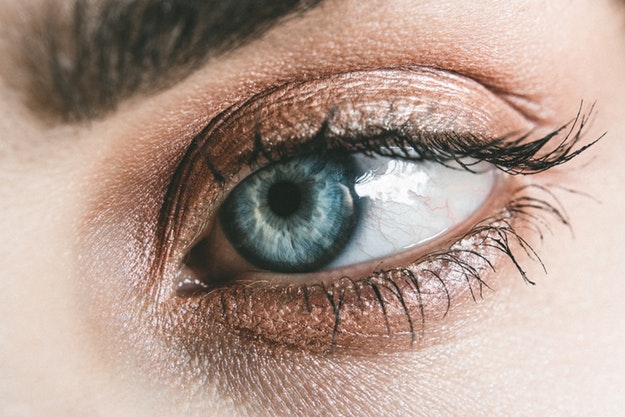A normal, healthy eye has properly functioning tear glands. These glands have two main roles. First, these glands produce large quantities of tears, either as part of an emotional response or as an emergency response to a substance that irritates your eyes (i.e., the tears you produce when chopping onions). Second, tear glands produce much smaller quantities of tears very regularly.
Tears are needed all of the time to keep eyes lubricated, free of dust, and comfortable. So, the tear glands regularly secrete small amounts of tears to keep our eyes functioning well. If you are suffering from dry eyes, your tear glands are not performing this function effectively enough.
Symptoms of dry eyes include:
- Itchy or irritated eyes
- Sore or gritty eyes
- Redness
- Sensitivity to bright light
- Very watery eyes (watering eyes are a common symptom of dry eyes, surprisingly)
What can help the problem?
Dry eye disease is a common problem. In the US, for example, around 7% of the population is believed to have the condition. It is far more prevalent in the elderly population (over 18% of people over 75) and more women suffer than men (around 9% compared to around 5%).
If you are one of the many people who need to alleviate this condition, there are several options that can make life easier. A first step is to work with your ophthalmologist to discover the cause of your dry eyes.
Possible causes of dry eyes
There are many possible causes of dry eyes. Some are environmental, some are connected to your lifestyle, and others are connected to other aspects of your health.
1. Environmental
Your everyday surroundings may be contributing to the problem if you live or work in the following conditions:
- Very dry air
- Temperature-controlled environments (air-conditioning or central heating)
- Windy conditions
- Smokey air
- Polluted areas
- Dusty air
2. Lifestyle
Excessive screen use is frequently associated with dry eyes due to a reduction in your rate of blinking.
3. Eye health
Other aspects of your eye health may be causing your dry eyes:
- Contact lens wearers quite often suffer from dry eyes because the lenses can cause increased tear evaporation.
- Your age can be a factor. As part of the natural ageing process of the eyes, tear production declines. By around 65 years of age, you are likely to be producing less than half the tears you produced as a young adult.
4. General health
The following can make dry eyes more likely:
- You are taking certain medications for other health conditions which may include beta-blockers, antihistamines, pain relief, and antidepressants.
- You are pregnant or menopausal.
- You have lupus, diabetes or thyroid abnormalities. Dry eyes are often a symptom of these diseases and others, so it is important to make your family doctor aware of your dry eye symptoms.
Stopping the problem
Whatever the cause of your dry eyes, you’ll be keen to lessen symptoms. While it’s important to have your eyes checked by an eye doctor, there are a few things you can try for yourself that may help:
- Practising good hygiene in the eye area, including fully removing makeup
- Protecting your eyes with goggles or glasses in dusty or windy conditions
- Taking a break regularly if you need to look at screens for long periods
- Taking steps to have a healthy home environment, including low dust levels and optimal humidity
Where to get help
Your ophthalmologist can provide effective treatments for dry eyes.
1. Artificial tears
These simulate real tears and thus provide temporary relief from the symptoms of dry eyes. They can soothe irritation and itchiness. However, they are not as ideal as a long-term solution. This is because they also wash away the natural defences of the eyes against infection. As such, they are ideal for use only as a short-term treatment.
2. Eye hygiene treatments
It is possible that a build-up of debris is causing your dry eyes. This can cause blepharitis or meibomian gland dysfunction and dry eyes.
Blepharitis is an inflammation of the eyelids that occurs when the oil glands at the base of the eyelashes become clogged.
Meibomian gland dysfunction is a blockage of the glands that produce the oil found in tears. This natural oil keeps your eyes lubricated.
Ophthalmologists can remove the debris blocking glands which should allow your tear glands to function normally again.
3. Punctal occlusion
Punctal occlusion is a permanent or semi-permanent closure of the tear duct, which is where tears drain from your eyes. This causes natural tears to stay in the eyes longer and provide more lubrication.
During this procedure, a tiny silicone plug is inserted into the tear ducts. It is a simple, quick procedure.
Why you should address the problem of dry eyes immediately
Dry eyes have uncomfortable symptoms. These symptoms can make everyday life difficult and affect your enjoyment of activities. It is wise to try to overcome the problem of dry eyes quickly for this reason.
However, it is also important to know that dry eyes can cause tissue damage and permanent scarring in the eye if left untreated. It is important to seek solutions and visit the best eye doctor in your location as soon as possible.
Author Bio
Dr Millicent M. Grim, Specialist Ophthalmologist & LASIK Specialist, is the Medical Director of Gulf Eye Center in Dubai. Since 2002, Gulf Eye Center’s highly qualified ophthalmologists and optometrists/ODs have been successfully treating a wide range of eye conditions using advanced techniques. They also provide comprehensive eye care and vision restoration procedures for people of all ages.










